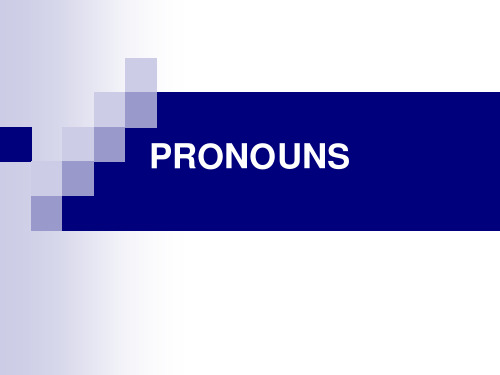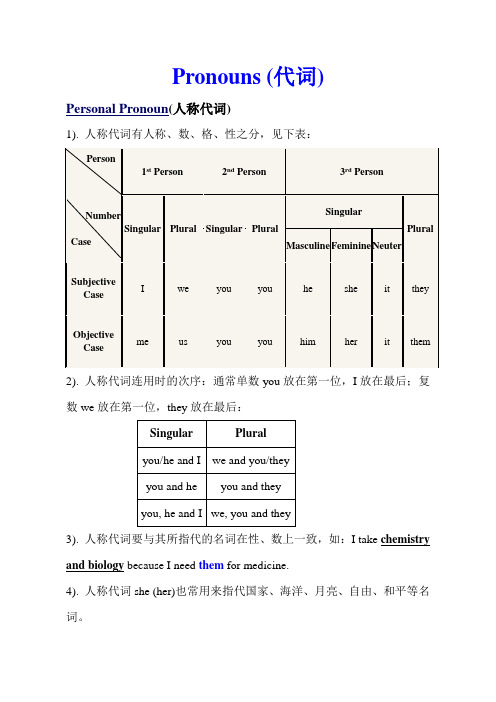英语Pronouns
英语语法 人称代词有哪些常见的例子

英语语法人称代词有哪些常见的例子
人称代词是英语中一种特殊的代词,用来代替特定的人或事物。
它们根据在句子中的角色,分为主格代词、宾格代词和所有格代词。
以下是人称代词的常见例子:
1. 主格代词(Subject Pronouns):
- I(我)
- you(你)
- he(他)
- she(她)
- it(它)
- we(我们)
- they(他们/她们/它们)
2. 宾格代词(Object Pronouns):
- me(我)
- you(你)
- him(他)
- her(她)
- it(它)
- us(我们)
- them(他们/她们/它们)
3. 所有格代词(Possessive Pronouns):
- mine(我的)
- yours(你的)
- his(他的)
- hers(她的)
- its(它的)
- ours(我们的)
- theirs(他们的/她们的/它们的)
这些人称代词在句子中扮演不同的角色,用于代替特定的人或事物。
例如,当我们需要代表自己时,可以使用主格代词"I";当我们需要代表对方时,可以使用宾格代词"you";当我们需要表达某物的所有权时,可以使用所有格代词"mine"或"yours"等。
需要注意的是,人称代词的使用与句子的语境和语法要求密切相关。
因此,在使用人称代词时,应谨慎选择适当的代词形式,并确保其与句子中的其他成分相匹配。
新编英语语法教程Pronouns

Personal pronouns:
I/ me, we/ us, you, he/ him, she/ her, it,
they/ them
Possessive pronouns:
my/ mine, our/ ours, you/ yours, his/
his, her/ hers, its/ its, their/ theirs
subjective case -------subject position objective case ------ other positions
2. minor sentence 3. everybody/ nobody + but/ except +
pronouns
Informality
Reflexive pronouns:
Reciprocal pronouns:
each other(‘s), one another(‘s)
Demonstrative pronouns:
this, that, these, those, it, such, same
This book is yours, and that is mine.
other night.
Concord in number
NUMBER: Antecedent: everyone, anyone, everybody,
anybody, no one, nobody, someone, somebody Pronoun?
The cast is giving ___ (its, their) bester, either.
I have do much work this morning.
初中英语语法 人称代词有哪些形式

初中英语语法人称代词有哪些形式初中英语语法知识点:人称代词的形式人称代词是用来代替人或物的名词的一种代词。
在英语中,人称代词根据不同的人称和数来区分形式。
下面是人称代词的不同形式:一、主格形式(Subjective Pronouns):主格形式的人称代词用于作为句子的主语。
1. 第一人称单数:I(我)2. 第二人称单数:you(你)3. 第三人称单数:he(他),she(她),it(它)4. 第一人称复数:we(我们)5. 第二人称复数:you(你们)6. 第三人称复数:they(他们/她们/它们)二、宾格形式(Objective Pronouns):宾格形式的人称代词用于作为动词或介词的宾语。
1. 第一人称单数:me(我)2. 第二人称单数:you(你)3. 第三人称单数:him(他),her(她),it(它)4. 第一人称复数:us(我们)5. 第二人称复数:you(你们)6. 第三人称复数:them(他们/她们/它们)三、物主代词形式(Possessive Pronouns):物主代词形式的人称代词用于表示所有权。
1. 第一人称单数:mine(我的)2. 第二人称单数:yours(你的)3. 第三人称单数:his(他的),hers(她的),its(它的)4. 第一人称复数:ours(我们的)5. 第二人称复数:yours(你们的)6. 第三人称复数:theirs(他们/她们/它们的)四、形容词性物主代词形式(Possessive Adjectives):形容词性物主代词形式的人称代词用于修饰名词。
1. 第一人称单数:my(我的)2. 第二人称单数:your(你的)3. 第三人称单数:his(他的),her(她的),its(它的)4. 第一人称复数:our(我们的)5. 第二人称复数:your(你们的)6. 第三人称复数:their(他们/她们/它们的)五、反身代词形式(Reflexive Pronouns):反身代词形式的人称代词用于强调动作的承受者与动作的执行者是同一个人或物。
什么是代词

什么是代词?代词(Pronouns)是英语中一类重要的词类,用于代替名词或名词短语,以避免重复使用特定的名词。
代词在句子中充当名词的角色,起到指代、替代或补充的作用。
代词可以根据其功能和用法进行分类。
以下是一些常见的代词分类:1. 人称代词(Personal Pronouns):人称代词用于代替特定的人或物。
它们分为主格和宾格,用于主语和宾语的位置。
例如:I(我)、you(你)、he(他)、she(她)、it(它)、we(我们)、they(他们)。
2. 物主代词(Possessive Pronouns):物主代词用于表示所属关系。
它们取代名词并表示所有权。
例如:mine(我的)、yours(你的)、hers(她的)、ours(我们的)、theirs(他们的)。
3. 反身代词(Reflexive Pronouns):反身代词用于强调动作的执行者同时也是受动作影响的对象。
例如:myself(我自己)、yourself(你自己)、himself(他自己)、herself(她自己)、itself(它自己)、ourselves(我们自己)、themselves(他们自己)。
4. 相互代词(Reciprocal Pronouns):相互代词用于表示相互关系。
例如:each other(彼此)、one another(互相)。
5. 指示代词(Demonstrative Pronouns):指示代词用于指示特定的人或物。
例如:this(这个)、that(那个)、these(这些)、those(那些)。
6. 疑问代词(Interrogative Pronouns):疑问代词用于引导疑问句。
例如:who?(谁?)、what?(什么?)、which?(哪个?)。
7. 关系代词(Relative Pronouns):关系代词用于引导定语从句,并在从句中起连接作用。
例如:who(谁)、which(哪个)、that(那个)。
Pronouns

Pronouns (代词)Personal Pronoun(人称代词)1). 人称代词有人称、数、格、性之分,见下表:2). 人称代词连用时的次序:通常单数you放在第一位,I放在最后;复数we放在第一位,they放在最后:3). 人称代词要与其所指代的名词在性、数上一致,如:I take chemistry and biology because I need them for medicine.4). 人称代词she (her)也常用来指代国家、海洋、月亮、自由、和平等名词。
5).it可指事物、动物、未知的人;可表示天气、时间、距离等,也可作形式主语、形式宾语来代替不定式短语、动名词短语或从句,it还可用于构成强调句型,如:It's Sunday today.I found it necessary to go on with this experiment.It's Mary that we are talking about.Possessive Pronoun(物主代词)1). 英语中的物主代词有形容词型和名词型两种,见下表:2). 形容词型物主代词只能用作定语,而名词型物主代词可用作主语、宾语和表语,如:I can't find my pen. Can you lend me yours?3). 名词型物主代词可与of连用,构成双重所有格,如:She is a friend of mine.4).形容词型物主代词his, her, their等在人称、性、数上要和它们所指代的名词一致。
如果不能判断句中名词的属性,一般用his,如:Every girl is doing her best.Each teacher has his own teaching method.5). 集合名词作整体看待时用its(或his,her)指代,作个体看待时用their 取代,如:The Smiths could not agree on where to spend their vacation.The public expressed its concern about the flood.Reflexive Pronoun(反身代词)1).英语反身代词有:myself, yourself, himself, herself, itself, ourselves, yourselves, themselves。
英语语法教程Pronouns

1. Just between you and I, me that man is crazy.
2. The petition was drafted by Nelson, Wright, and I, me .
hiding ___ among a flock of ship. As soon as the plane had hopped off, ___ picked up
speed. China is my motherland. __ has experienced huge
changes during the past decades.
PRONOUNS
1. classification 2. concord 3. case forms 4. reflexive pronouns
Pronoun
pro a. supporting or approving of something. b. doing something instead of someone.
neither, either.
I have do much work this morning.
He has done much for his wife.
Concord
ANTECEDENT a word, phrase or sentence that is represented by
Pronouns are words used instead of nouns, thus have nominal functions.
Classification
personal, possessive, reflexive, reciprocal, demonstrative, interrogative, relative, indefinite pronouns.
代词pronouns
代词种类:人称代词,物主代词,反身代词,相互代词,指示代词,疑问代词,关系代词,不定代词1.人称代词personal pronouns主格:I you he she it they we宾格:me you him her it them us2.物主代词possessive pronouns形容词性~:my your his her its t heir our名词性~:mine yours his hers its theirs ours3.反身代词reflexive pronounsMyself yourself himself ......4.相互代词reciprocal pronounsEach other , one another5.指示代词demonstrative pronounsThis that these those such same6.疑问代词interrogative pronounsWho whom whose which what ..7.关系代词relative pronounsWho that which ....8.不定代词infinitive pronounsSome something any anything anyone much little few all one both......1.2.3.略四、反身代词的用法1)定义:如人称代词一致,反身代词的人称和数以及性要和它所指代的名词或代词一致。
2)反身代词的句法功能反身代词可用作宾语、同位语、表语等。
用作同位语时,主要用于加强被修饰词的语气,可紧放在被修饰名词后或句末。
如:He himself was a doctor. (同位语) =He was a doctor himself.She is too young to look after herself. (宾语) I don't blame you, I blame myself(宾语). He cut himself when he was cooking.(宾语) That poor boy was myself.(表语)那个可怜的孩子就是我自己。
pronouns(代词的用法)
宾语
which / that my best friend gave I like reading the books __________ me as gifts.
定语从句 The girl ____ won the gold medal comes from Beijing Sunshine Secondary School. A. who B. which C. what D. whom
me
you him her it
we
you they
us
you them
Mary, please show______ your picture. A. my B. mine C. I D. me
解析:show sb. sth. 空白处需要间接宾语,所以选人称代 词的宾格形式。
Possessive pronouns(物主代词)
(物主代词)
self pronouns (反身代词)
Pronouns
(代词)
demonstrative pronouns
interrogative pronouns (疑问代词)
(指示代词) relative pronouns
(关系代词)
Round 1!
Exercises for each group!You can choose a letter and do the exercises behind it.
类别 人称
数
第一人称
形容词性 物主代词
名词性 物主代复 数
第一人称 第二人称 第三人称
my your his her its our your their
mine yours his hers
(完整版)高中英语代词
(完整版)高中英语代词代词可以分为下列九类1 人称代词(personal pronouns): I You She2 物主代词(Possessive Pronouns): My, His3 自身代词(self pronouns): myself4. 相互代词(reciprocal pronouns): one another, each other5. 指示代词(demonstrative Pronouns):this, that, those, these6. 疑问代词(interrogative pronouns): who, whom, whose, what, which用来构成特殊问句的。
7. 关系代词(relative pronouns): who, whom, whose, that, which等引导定语从句的。
8. 连接代词(conjunctive pronouns):疑问代词都可以用作连接代词,来引起主语从句,宾语从句和表语从句。
9 不定代词(indefinite pronouns): all, each, both等一人称代词人称代词做主语时用主格,做宾语时用宾格。
在作表语时,用宾格较多,例如:Who is knocking at the door? --- It’s me.但在强调结构中却常用主格:It was he who did it.It is she who wants this clothes.在使用人称代词时有下面几点值得注意:1)she可以用来代表国家,船只,大地,月亮等。
e.g. I think England will do what she promised to do.2) 在并列的主语中,I总放在最后。
e.g. Mary and I will be in charge of the case.3) 第三人称,男女两性并用时,男先女后。
He and she still don’t agree to the plan.二物主代词1.1)表语Whose dictionary is this? ----it’s mine.2) 主语Ours is a big family.3) 宾语Let’s clean their room first and ours later.2. “of +名词性物主代词”可用作定语That car of hers is always breaking down.= Her car is …….三11)作宾语I can’t express myself in English.2) 作表语I am not quite myself these days. 我近来身体不大舒服。
英语十大词类一览表
5、动词、Verb (v.)表示动作或状态Jump、sing、动、形、副等词、表示动作特征there、widely、suddenly
7、连词、Conjunctions (conj.)表示人或事物的名称if、because、but8、介词、Prepositions (prep.)用在名词或代词前、说明它与别的词的关系in、on、down、up
9、冠词、Articles (art.)用在名词前、帮助说明名词所指的范围a、an、the
10、感叹词、Interjections (int.)代替名词、数词、形容词等oh、hello、hi、yeahvt.是及物动词、vt.后必须跟宾语:sing a songvi.是不及物动词、vi.后不直接带宾语或不带宾语:jump high
英语十大词类一览表
1、代词、Pronouns (pron.)代替名词、数词、形容词We、this、them、myself
2、名词、Nouns (n.)表示人或事物的名称box、pen、tree、apple
3、形容词、Adjectives(adj.)用来修饰名词、表示人或事物的特征good、sad、high、short
- 1、下载文档前请自行甄别文档内容的完整性,平台不提供额外的编辑、内容补充、找答案等附加服务。
- 2、"仅部分预览"的文档,不可在线预览部分如存在完整性等问题,可反馈申请退款(可完整预览的文档不适用该条件!)。
- 3、如文档侵犯您的权益,请联系客服反馈,我们会尽快为您处理(人工客服工作时间:9:00-18:30)。
Missed it! Try Again
Think about what or who the pronoun represents.
Got it! Now try another.
Speed bumps help to slow down cars. They are found in many parking lots. bumps = They
Missed it! Try Again
Think about what or who the pronoun represents.
Got it! Now try another.
A hill is next to them. It is very steep. A hill= It
Choose the correct pronoun.
Choose the correct pronoun.
Marisa and Nora made their own costumes. wanted to save money. A. Them B. We C. They D. She
Missed it! Try Again
Think about what or who the pronoun represents.
Skateboards are fun, but they can be dangerous Skateboards = they
Choose the correct pronoun.
Speed bumps help to slow down cars. are found in many parking lots. A. It B. You C. Them D. They
Example:
Halloween is one of America's holidays. It is celebrated in October. (Halloween is a noun. Halloween It is a pronoun that refers to the antecedent, Halloween.)
Example:
When Robert was fixing the car, he cut his hand. (Robert is a noun. He is Robert a pronoun that refers to the antecedent, Robert.)
Personal Pronouns
Missed it! Try n
Think about what or who the pronoun represents.
Got it! Now try another.
Rickie gets on the plane. He is very excited about his trip. Rickie
A. A hill is next to them. They are very steep. B. Jeff rides his new bike. Him rides it down the block. C. Rickie gets on the plane. He is very excited about his trip.
=
He
Ready for a test?
Try the online Pronoun Practice Test by clicking the button below.
Missed it! Try Again
Think about what or who the pronoun represents.
Got it!
Blake skated to the edge of the rink. He was finished with practice. Blake
Got it! Now try another.
Marisa and Nora made their own costumes. They wanted to save money. Marisa and Nora = They
Which of the following contains a correct pronoun?
What are Pronouns?
He
Grades 3-5 3-
I
Sh e
We We
Us
What are pronouns?
Pronouns take the place of nouns. The word or phrase replaced by a pronoun is called an antecedent. antecedent
ME!
Examples:
1. He
took her place in the game. 2. Their main objective is to scare students.
Now you try. Which of the following contains a correct pronoun?
Skateboards are fun, but can be dangerous. A. them B. it C. they D. we
Missed it! Try Again
Think about what or who the pronoun represents.
Got it! Now try another.
= He
Which of the following contains a correct pronoun?
A. Blake skated to the edge of the rink. He was finished with practice. B. The house has two stories. She was built in 1910. C. Mary and Dave rode their bikes to the playground. Them will build a sandcastle.
A. A hill is next to them. It is very steep. B. Jeff rides his new bike. Him rides it down the block. C. Rickie gets on the plane. They are very excited about his trip.
Refer to people or things Include: I, me, my, mine, you, your, yours, he, him, his, she, her, hers, it, its, they, them, their, theirs, we, us, our, ours.
